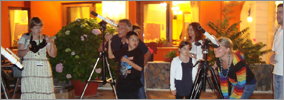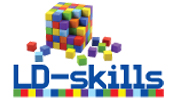Methodology
Throughout the duration of the course teachers will be handled in three different modes
a) As learners participating in real world learning activities
b) As teachers implementing problem-solving and collaborative strategies in their classes
c) As researchers collecting, examining and interpreting data about their practice and their students’ learning.
Participants will be provided with templates that promote standards based teaching, student-centered learning, and using more effective strategies to reach students (indicative examples are: Guided Research Model, Inquiry Based Teaching, Project-based Learning, The 5E Instructional Model (Constructivist Model), The Learning Cycle (Supporting Conceptual Change), ICT supported Culture Awareness Learning (ICCAL), and Direct Instruction), which they will be given the opportunity to modify according to their discipline and every day teaching practices. A number of indicative portals (such as COSMOS [www.cosmosportal.eu], OSR [www.osrportal.eu], Learning with ATLAS@CERN [www.ea.gr/ep/lacern], Natural Europe [www.natural-europe.eu], Organic.Edunet [www.organic-edunet.eu], MERLOT [www.merlot.org], MELT [www.melt-project.eu], CALIBRATE [calibrate.eun.org]) will be proposed to participants in order to help them develop their technology enhanced learning scenarios. The training course comprises 15 hours of presentations and demonstrations and 15 hours of hands-on workshops. The workshops will be held in a multimedia laboratory where each participant will have direct access to a PC and will carry out planned exercises (participants are strongly encouraged to bring their own laptops). A visit to the Skinakas Observatory and to the Natural History Museum of Crete will introduce participants to innovative ways for creating links between schools, research centres and informal learning settings.













